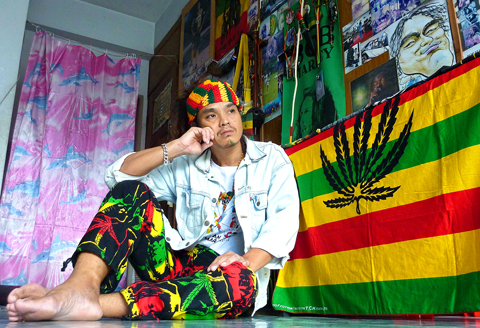With dreadlocks, denim and the Rastafarian colors of red, green and gold, singer Saw Phoe Kwar’s homage to reggae legend Bob Marley is hard to miss as his band, One Love, strikes up in a Yangon bar.
However, the 42-year-old says comparisons with his late Jamaican hero should only go so far.
“In Myanmar a lot of people call me Bob ... I like that! But Bob Marley had more freedom in Jamaica to express himself with his music. Here in Myanmar I can’t do it like that. I’m more limited,” he says.

PHOTO: AFP
Musicians in the military-ruled nation must submit all their song lyrics to a tough board of censors, who ban anything they deem to be anti-regime or at odds with the Buddhist country’s values.
Saw Phoe Kwar has come up against their diktats repeatedly since producing his debut solo album 10 years ago, in which three of his songs were judged taboo.
His attempt at a second album met with a more bizarre response.
“The whole thing was canceled because they didn’t know what reggae was. When they realized reggae was not to do with politics they let it go, but they made me pay 5,000 kyat [US$5] for every use of the word reggae,” he says.
Despite these restrictions, he thinks reggae offers a more liberating form of expression than the more popular genres of hip hop, rock and pop, which dominate Myanmar’s youth music scene.
“I want to live my life freely and I saw freedom in reggae ... We have more freedom than in other kinds of music,” he says.
The father of two, born in Yangon, listened to his first Bob Marley tape at the age of 15, but it was during a job on a cargo ship in the early ’90s with numerous reggae-mad West Indian colleagues that his passion took off.
He now concentrates on his music, choosing to sing “messages of peace,” but he takes care not to overstep the boundaries.
“I sing about Myanmar indirectly. If I sang directly I would not be here,” he says with a laugh.
Myanmar, under military rule since 1962, is holding its first election in 20 years on Nov. 7. Outside critics have dismissed the polls as a sham that will change little in the isolated nation, while few citizens seem optimistic.
Music obsessive Saw Phoe Kwar hasn’t given much attention to the process.
“I just focus on my own role,” he says. “I have to do my own thing.”
Censors are not the only challenge for singers trying to make it in the country, particularly those working in lesser-known genres such as reggae, according to a Yangon-based events director who goes by the name of Ice Man.
“There are thousands of musicians waiting for their time to perform on stage. It can be 5,000 dollars to put on a concert,” he says. “Not a lot of people are willing to put on events.”
While the music scene is increasingly lively in Yangon, about two-thirds of the population live in rural areas and many are mired in poverty after decades of economic mismanagement by the junta.
“The country is thinking about eating, finding somewhere to live,” 39-year-old Ice Man explains. “You go to entertainment if you have extra money. People cannot afford to go to concerts.”
Those who do have the cash are more likely to chose rock over reggae, but Ice Man believes that is changing.
“I think reggae for Myanmar is coming soon, maybe in one year,” he says. “Even Myanmar’s best DJ didn’t know about reggae, but now everyone is talking about it” — a trend he largely puts down to Saw Phoe Kwar.
“He will always be a legend for Myanmar,” Ice Man says. “He introduced reggae.”
The singer himself hopes this won’t be his only legacy.
“I want to help close the gap between the people and the government. When the gap is closed, the other artists and I can compose more freely. I hope the gap will close in my lifetime,” he says.

VENEZUELAN ACTION: Marco Rubio said that previous US interdiction efforts have not stemmed the flow of illicit drugs into the US and that ‘blowing them up’ would US President Donald Trump on Wednesday justified a lethal military strike that his administration said was carried out a day earlier against a Venezuelan gang as a necessary effort by the US to send a message to Latin American cartels. Asked why the military did not instead interdict the vessel and capture those on board, Trump said that the operation would cause drug smugglers to think twice about trying to move drugs into the US. “There was massive amounts of drugs coming into our country to kill a lot of people and everybody fully understands that,” Trump said while hosting Polish President

A French couple kept Louise, a playful black panther, in an apartment in northern France, triggering panic when she was spotted roaming nearby rooftops. The pair were were handed suspended jail sentences on Thursday for illegally keeping a wild animal, despite protesting that they saw Louise as their baby. The ruling follows a September 2019 incident when the months-old feline was seen roaming a rooftop in Armentieres after slipping out of the couple’s window. Authorities captured the panther by sedating her with anesthetic darts after she entered a home. No injuries were reported during the animal’s time on the loose. The court in the

Japan yesterday heralded the coming-of-age of Japanese Prince Hisahito with an elaborate ceremony at the Imperial Palace, where a succession crisis is brewing. The nephew of Japanese Emperor Naruhito, Hisahito received a black silk-and-lacquer crown at the ceremony, which marks the beginning of his royal adult life. “Thank you very much for bestowing the crown today at the coming-of-age ceremony,” Hisahito said. “I will fulfill my duties, being aware of my responsibilities as an adult member of the imperial family.” Although the emperor has a daughter — Princess Aiko — the 23-year-old has been sidelined by the royal family’s male-only

For more than a century, the fate of the dazzling Darya-e-Noor diamond has been sealed inside a bank vault — a mystery that haunts Khawaja Naim Murad, great-grandson of the last prince, or nawab, of Dhaka. Locked away in 1908, were the family’s heirlooms lost during the violence at the end of British rule in 1947? Did they survive Bangladesh’s war of independence in 1971 and the string of coups that followed, or are they still safe, dusty, but untouched? Many suspect that the jewels are long gone and officials at the state-run bank hesitate to simply open the vault, fearing that they